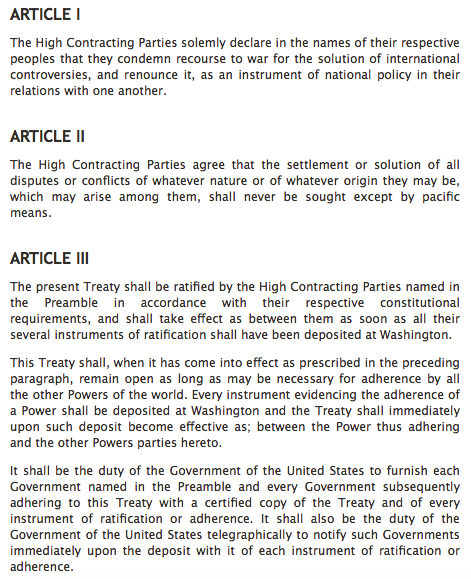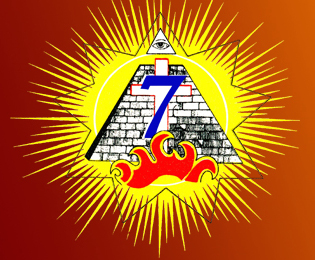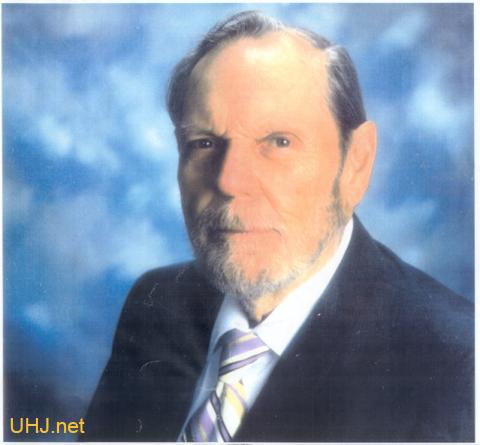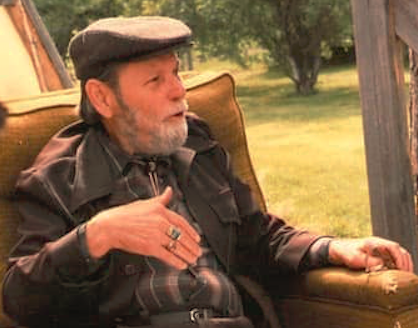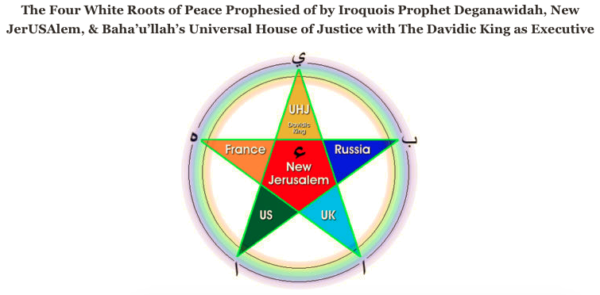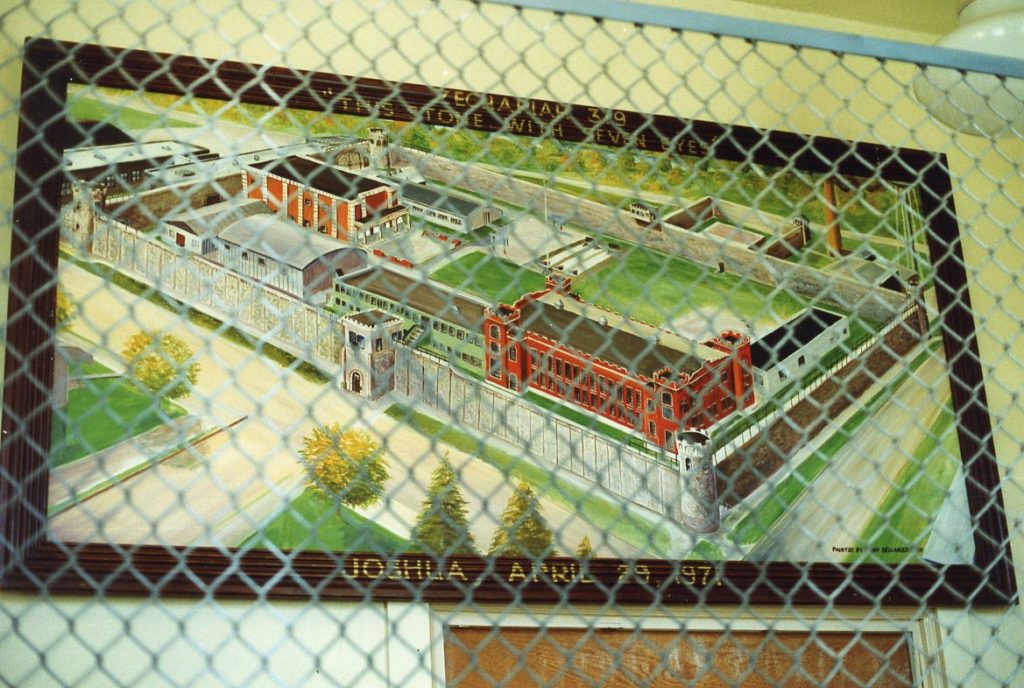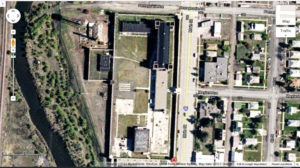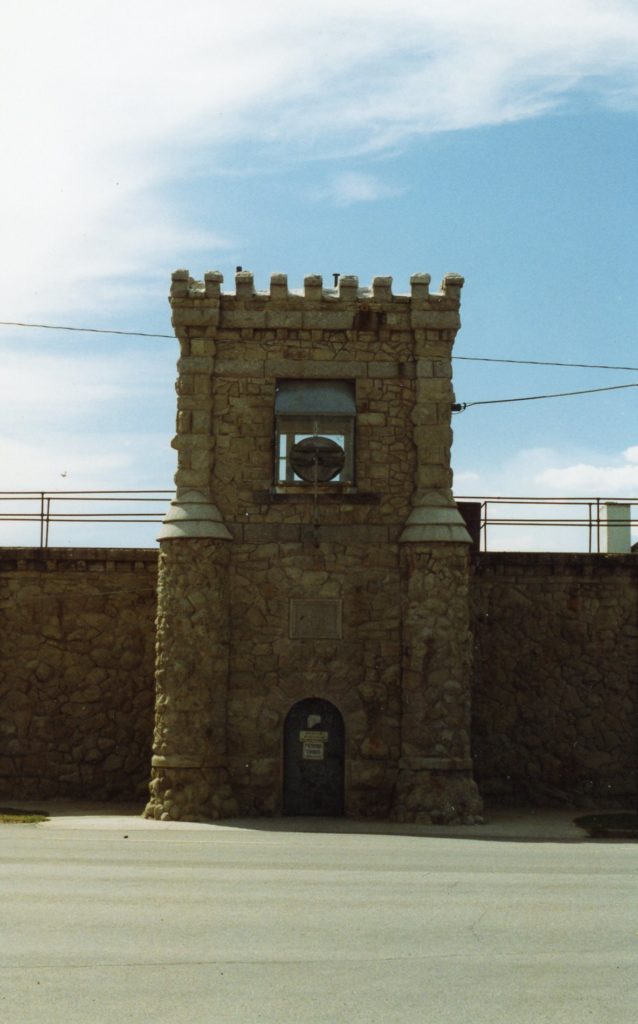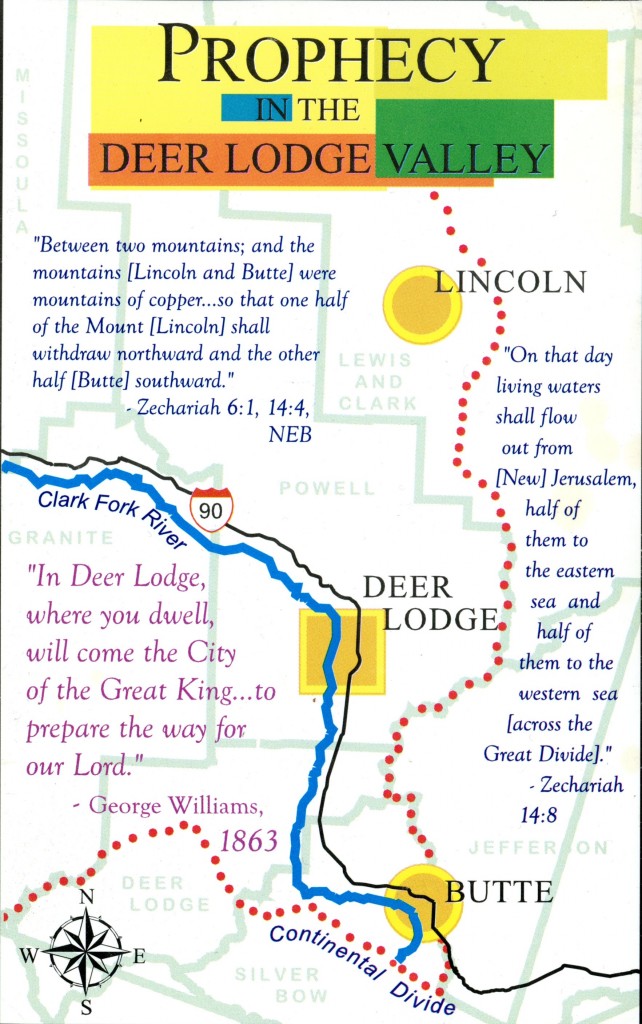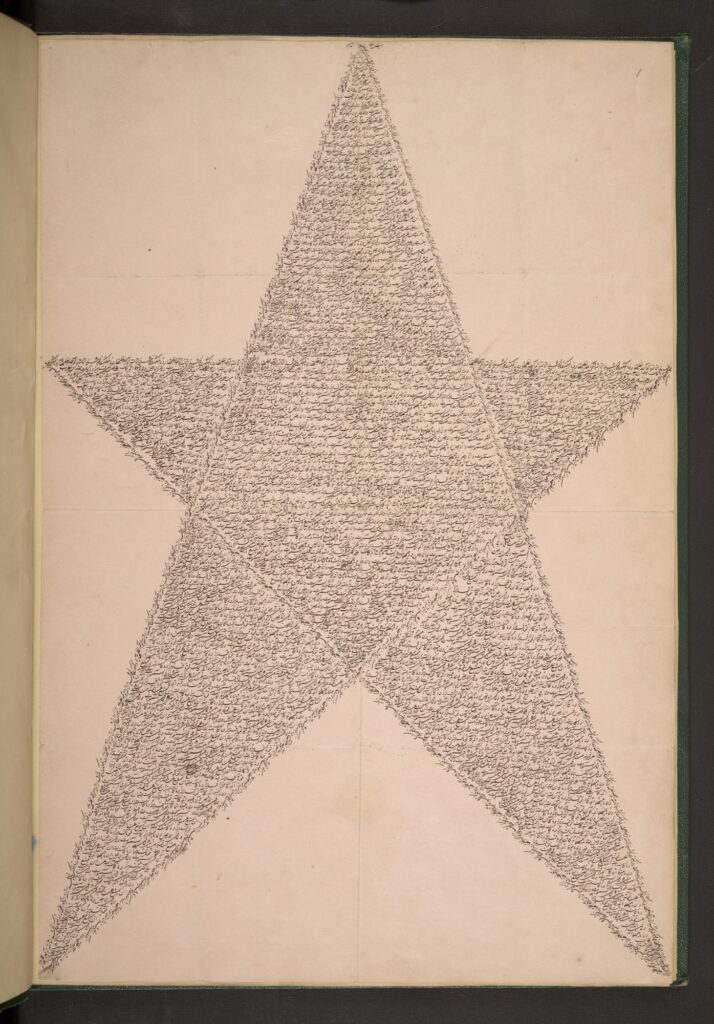
Click on Picture to Enlarge
*****
Baha’u’llah
This treatise was written in reply to a seeker who had asked how the promised Mihdí could have become transformed into ‘Alí-Muḥammad (the Báb). The opportunity provided by this question was seized to elaborate on a number of subjects, all of which are of use and benefit both to them that seek and to those who have attained, could ye perceive with the eye of divine virtue.
Baha’u’llah, Preface to Gems of Divine Mysteries
*****
I heard, with Mine own ears, one of their divines proclaim: “Should all these signs come to pass and the long-awaited Qá’im appear, and should He ordain, with respect to even our secondary laws, aught beyond that which hath been revealed in the Qur’án, we would assuredly charge Him with imposture, put Him to death, and refuse forever to acknowledge Him”, and other statements such as these deniers make. And all this, when the Day of Resurrection hath been ushered in, and the Trumpet hath been sounded, and all the denizens of earth and heaven have been gathered together, and the Balance hath been appointed, and the Bridge hath been laid, and the Verses have been sent down, and the Sun hath shone forth, and the stars have been blotted out, and the souls have been raised to life, and the breath of the Spirit hath blown, and the angels have been arrayed in ranks, and Paradise hath been brought nigh, and Hell made to blaze! These things have all come to pass, and yet to this day not a single one of these people hath recognized them! They all lie as dead within their own shrouds, save those who have believed and repaired unto God, who rejoice in this day in His celestial paradise, and who tread the path of His good-pleasure.
Veiled as they remain within their own selves, the generality of the people have failed to perceive the sweet accents of holiness, inhale the fragrance of mercy, or seek guidance, as bidden by God, from those who are the custodians of the Scriptures. He proclaimeth, and His word, verily, is the truth: “Ask ye, therefore, of them that have the custody of the Scriptures, if ye know it not.” Nay rather, they have turned aside from them and followed instead the Sámirí of their own idle fancies. Thus have they strayed far from the mercy of their Lord and failed to attain unto His Beauty in the day of His presence. For no sooner had He come unto them with a sign and a testimony from God than the same people who had eagerly awaited the day of His Revelation, who had called upon Him in the daytime and in the night season, who had implored Him to gather them together in His presence and to grant that they may lay down their lives in His path, be led aright by His guidance and illumined by His light—this very people condemned and reviled Him, and inflicted upon Him such cruelties as transcend both My capacity to tell and thine ability to hear them. My very pen crieth out at this moment and the ink weepeth sore and groaneth. By God! Wert thou to hearken with thine inner ear, thou wouldst in truth hear the lamentations of the denizens of heaven; and wert thou to remove the veil from before thine eyes, thou wouldst behold the Maids of Heaven overcome and the holy souls overwhelmed, beating upon their faces and fallen upon the dust.
Alas, alas, for that which befell Him Who was the Manifestation of the Self of God, and for that which He and His loved ones were made to suffer! The people inflicted upon them what no soul hath ever inflicted upon another, and what no infidel hath wrought against a believer or suffered at his hand. Alas, alas! That immortal Being sat upon the darksome dust, the Holy Spirit lamented in the retreats of glory, the pillars of the Throne crumbled in the exalted dominion, the joy of the world was changed into sorrow in the crimson land, and the voice of the Nightingale was silenced in the golden realm. Woe betide them for what their hands have wrought and for what they have committed!
*****
But as to Him Who appeared in the year sixty, He standeth in need of neither transformation nor interpretation, for His name was Muḥammad, and He was a descendent of the Imáms of the Faith. Thus it can be truly said of Him that He was the son of Ḥasan, as is undoubtedly clear and evident unto thine eminence. Nay, He it is Who fashioned that name and created it for Himself, were ye to observe with the eye of God.
Baha’u’llah, Gems of Divine Mysteries (excerpts)
*****
Reflect, O Shaykh, upon the Shí’ih sect. How many the edifices which they reared with the hands of idle fancies and vain imaginings, and how numerous the cities which they built! At length those vain imaginings were converted into bullets and aimed at Him Who is the Prince of the world. Not one single soul among the leaders of that sect acknowledged Him in the Day of His Revelation! Whenever His blessed name was mentioned, all would say: “May God hasten the joy His coming will bring!” On the day of the Revelation of that Sun of Truth, however, all, as hath been observed, have exclaimed, saying: “May God hasten His chastisement!” He Who was the Essence of being and Lord of the seen and unseen they suspended, and committed what made the Tablet to weep, and the Pen to groan, and the cries of the sincere to break forth, and the tears of the favored ones to flow.
Baha’u’llah, Epistle To The Son Of The Wolf
*****
Abdu’l-Baha’
Now the Siyyid Báb had disposed all His affairs before setting out from Chihríq towards Tabríz, had placed His writings and even His ring and pen-case in a specially prepared box, put the key of the box in an envelope, and sent it by means of Mullá Báqir, who was one of His first associates, to Mullá ‘Abdu’l-Karím of Qazvín. This trust Mullá Báqir delivered over to Mullá ‘Abdu’l-Karím at Qum in presence of a numerous company. At the solicitations of those present he opened the lid of the box and said, “I am commanded to convey this trust to Bahá’u’lláh: more than this ask not of me, for I cannot tell you.” Importuned by the company, he produced a long epistle in blue, penned in the most graceful manner with the utmost delicacy and firmness in a beautiful minute shikastih hand, written in the shape of a man so closely that it would have been imagined that it was a single wash of ink on the paper. When they had read this epistle [they perceived that] He had produced three hundred and sixty derivatives from the word Bahá. Then Mullá ‘Abdu’l-Karím conveyed the trust to its destination.
Well, we must return to our original narrative. The Prime Minister issued a second order to his brother Mírzá Ḥasan Khán, the gist of which order was this: “Obtain a formal and explicit sentence from the learned doctors of Tabríz who are the firm support of the Church of Ja’far (upon him be peace) and the impregnable stronghold of the Shí‘ite faith; summon the Christian regiment of Urúmíyyih; suspend the Báb before all the people; and give orders for the regiment to fire a volley.”
Mírzá Ḥasan Khán summoned his chief of the farráshes, and gave him his instructions. They removed the Báb’s turban and sash which were the signs of His Siyyid-hood, brought Him with four of His followers to the barrack square of Tabríz, confined Him in a cell, and appointed forty of the Christian soldiers of Tabríz to guard Him.
Next day the chief of the farráshes delivered over the Báb and a young man named Áqá Muḥammad-‘Alí who was of a noble family of Tabríz to Sám Khán, colonel of the Christian regiment of Urúmíyyih, at the sentences of the learned divine Mullá Muḥammad of Mamaqán, of the second ecclesiastical authority Mullá Mírzá Báqir, and of the third ecclesiastical authority Mullá Murtadá-Qulí and others. An iron nail was hammered into the middle of the staircase of the very cell wherein they were imprisoned, and two ropes were hung down. By one rope the Báb was suspended and by the other rope Áqá Muḥammad-‘Alí, both being firmly bound in such wise that the head of that young man was on the Báb’s breast. The surrounding housetops billowed with teeming crowds. A regiment of soldiers ranged itself in three files. The first file fired; then the second file, and then the third file discharged volleys. From the fire of these volleys a mighty smoke was produced. When the smoke cleared away they saw that young man standing and the Báb seated by the side of His amanuensis Áqá Siyyid Ḥusayn in the very cell from the staircase of which they had suspended them. To neither one of them had the slightest injury resulted.
Sám Khán the Christian asked to be excused; the turn of service came to another regiment, and the chief of the farráshes withheld his hand. Áqá Ján Big of Khamsíh, colonel of the bodyguard, advanced; and they again bound the Báb together with that young man to the same nail. The Báb uttered certain words which those few who knew Persian understood, while the rest heard but the sound of His voice.
The colonel of the regiment appeared in person: and it was before noon on the twenty-eighth day of Sha’bán in the year [A.H.] one thousand two hundred and sixty-six. Suddenly he gave orders to fire. At this volley the bullets produced such an effect that the breasts [of the victims] were riddled, and their limbs were completely dissected, except their faces, which were but little marred.
Then they removed those two bodies from the square to the edge of the moat outside the city, and that night they remained by the edge of the moat. Next day the Russian consul came with an artist and took a picture of those two bodies in the posture wherein they had fallen at the edge of the moat.
On the second night at midnight the Bábís carried away the two bodies.
On the third day the people did not find the bodies, and some supposed that the wild beasts had devoured them, so that the doctors proclaimed from the summits of their pulpits saying, “The holy body of the immaculate Imám and that of the true Shí‘ite are preserved from the encroachments of beasts of prey and creeping things and wounds, but the body of this person have the wild beasts torn in pieces.” But after the fullest investigation and inquiry it hath been proved that when the Báb had dispersed all His writings and personal properties and it had become clear and evident from various signs that these events would shortly take place, therefore, on the second day of these events, Sulaymán Khán the son of Yaḥyá Khán, one of the nobles of Ádhirbáyján devoted to the Báb, arrived, and proceeded straightway to the house of the mayor of Tabríz. And since the mayor was an old friend, associate, and confidant of his; since, moreover, he was of the mystic temperament and did not entertain aversion or dislike for any sect, Sulaymán Khán divulged this secret to him saying, “Tonight I, with several others, will endeavor by every means and artifice to rescue the body. Even though it be not possible, come what may we will make an attack, and either attain our object or pour out our lives freely in this way.” “Such troubles,” answered the mayor, “are in no wise necessary.” He then sent one of his private servants named Ḥájí Alláh-Yár, who, by whatever means and proceedings it was, obtained the body without trouble or difficulty and handed it over to Ḥájí Sulaymán Khán. And when it was morning the sentinels, to excuse themselves, said that the wild beasts had devoured it. That night they sheltered the body in the workshop of a Bábí of Milán: next day they manufactured a box, placed it in the box, and left it as a trust. Afterwards, in accordance with instructions which arrived from Ṭihrán, they sent it away from Ádhirbáyján. And this transaction remained absolutely secret.
Abdu’l-Baha’
Exc. from: A Traveler’s Narrative-Written to Illustrate the Episode of the Bab
*****
Shoghi Effendi
The waves of dire tribulation that violently battered at the Faith, and eventually engulfed, in rapid succession, the ablest, the dearest and most trusted disciples of the Báb, plunged Him, as already observed, into unutterable sorrow. For no less than six months the Prisoner of Chihríq, His chronicler has recorded, was unable to either write or dictate. Crushed with grief by the evil tidings that came so fast upon Him, of the endless trials that beset His ablest lieutenants, by the agonies suffered by the besieged and the shameless betrayal of the survivors, by the woeful afflictions endured by the captives and the abominable butchery of men, women and children, as well as the foul indignities heaped on their corpses, He, for nine days, His amanuensis has affirmed, refused to meet any of His friends, and was reluctant to touch the meat and drink that was offered Him. Tears rained continually from His eyes, and profuse expressions of anguish poured forth from His wounded heart, as He languished, for no less than five months, solitary and disconsolate, in His prison.
The pillars of His infant Faith had, for the most part, been hurled down at the first onset of the hurricane that had been loosed upon it. Quddús, immortalized by Him as Ismu’lláhi’l-Ákhir (the Last Name of God); on whom Bahá’u’lláh’s Tablet of Kullu’t-Tá’am later conferred the sublime appellation of Nuqṭiy-i-Ukhrá (the Last Point); whom He elevated, in another Tablet, to a rank second to none except that of the Herald of His Revelation; whom He identifies, in still another Tablet, with one of the “Messengers charged with imposture” mentioned in the Qur’án; whom the Persian Bayán extolled as that fellow-pilgrim round whom mirrors to the number of eight Vahíds revolve; on whose “detachment and the sincerity of whose devotion to God’s will God prideth Himself amidst the Concourse on high;” whom ‘Abdu’l-Bahá designated as the “Moon of Guidance;” and whose appearance the Revelation of St. John the Divine anticipated as one of the two “Witnesses” into whom, ere the “second woe is past,” the “spirit of life from God” must enter—such a man had, in the full bloom of his youth, suffered, in the Sabzih-Maydán of Barfurúsh, a death which even Jesus Christ, as attested by Bahá’u’lláh, had not faced in the hour of His greatest agony. Mullá Ḥusayn, the first Letter of the Living, surnamed the Bábu’l-Báb (the Gate of the Gate); designated as the “Primal Mirror;” on whom eulogies, prayers and visiting Tablets of a number equivalent to thrice the volume of the Qur’án had been lavished by the pen of the Báb; referred to in these eulogies as “beloved of My Heart;” the dust of whose grave, that same Pen had declared, was so potent as to cheer the sorrowful and heal the sick; whom “the creatures, raised in the beginning and in the end” of the Bábí Dispensation, envy, and will continue to envy till the “Day of Judgment;” whom the Kitáb-i-Íqán acclaimed as the one but for whom “God would not have been established upon the seat of His mercy, nor ascended the throne of eternal glory;” to whom Siyyid Kázim had paid such tribute that his disciples suspected that the recipient of such praise might well be the promised One Himself—such a one had likewise, in the prime of his manhood, died a martyr’s death at Tabarsí. Vahíd, pronounced in the Kitáb-i-Íqán to be the “unique and peerless figure of his age,” a man of immense erudition and the most preeminent figure to enlist under the banner of the new Faith, to whose “talents and saintliness,” to whose “high attainments in the realm of science and philosophy” the Báb had testified in His Dalá’il-i-Sab‘ih (Seven Proofs), had already, under similar circumstances, been swept into the maelstrom of another upheaval, and was soon to quaff in his turn the cup drained by the heroic martyrs of Mázindarán. Hujjat, another champion of conspicuous audacity, of unsubduable will, of remarkable originality and vehement zeal, was being, swiftly and inevitably, drawn into the fiery furnace whose flames had already enveloped Zanján and its environs. The Báb’s maternal uncle, the only father He had known since His childhood, His shield and support and the trusted guardian of both His mother and His wife, had, moreover, been sundered from Him by the axe of the executioner in Ṭihrán. No less than half of His chosen disciples, the Letters of the Living, had already preceded Him in the field of martyrdom. Táhirih, though still alive, was courageously pursuing a course that was to lead her inevitably to her doom.
A fast ebbing life, so crowded with the accumulated anxieties, disappointments, treacheries and sorrows of a tragic ministry, now moved swiftly towards its climax. The most turbulent period of the Heroic Age of the new Dispensation was rapidly attaining its culmination. The cup of bitter woes which the Herald of that Dispensation had tasted was now full to overflowing. Indeed, He Himself had already foreshadowed His own approaching death. In the Kitáb-i-Panj-Sha’n, one of His last works, He had alluded to the fact that the sixth Naw-Rúz after the declaration of His mission would be the last He was destined to celebrate on earth. In His interpretation of the letter Há, He had voiced His craving for martyrdom, while in the Qayyúmu’l-Asmá He had actually prophesied the inevitability of such a consummation of His glorious career. Forty days before His final departure from Chihríq He had even collected all the documents in His possession, and placed them, together with His pen-case, His seals and His rings, in the hands of Mullá Báqir, a Letter of the Living, whom He instructed to entrust them to Mullá ‘Abdu’l-Karím-i-Qazvíní, surnamed Mírzá Aḥmad, who was to deliver them to Bahá’u’lláh in Ṭihrán.
While the convulsions of Mázindarán and Nayríz were pursuing their bloody course the Grand Vizir of Náṣiri’d-Dín Sháh, anxiously pondering the significance of these dire happenings, and apprehensive of their repercussions on his countrymen, his government and his sovereign, was feverishly revolving in his mind that fateful decision which was not only destined to leave its indelible imprint on the fortunes of his country, but was to be fraught with such incalculable consequences for the destinies of the whole of mankind. The repressive measures taken against the followers of the Báb, he was by now fully convinced, had but served to inflame their zeal, steel their resolution and confirm their loyalty to their persecuted Faith. The Báb’s isolation and captivity had produced the opposite effect to that which the Amír-Nizám had confidently anticipated. Gravely perturbed, he bitterly condemned the disastrous leniency of his predecessor, Ḥájí Mírzá Aqásí, which had brought matters to such a pass. A more drastic and still more exemplary punishment, he felt, must now be administered to what he regarded as an abomination of heresy which was polluting the civil and ecclesiastical institutions of the realm. Nothing short, he believed, of the extinction of the life of Him Who was the fountain-head of so odious a doctrine and the driving force behind so dynamic a movement could stem the tide that had wrought such havoc throughout the land.
The siege of Zanján was still in progress when he, dispensing with an explicit order from his sovereign, and acting independently of his counsellors and fellow-ministers, dispatched his order to Prince Ḥamzih Mírzá, the Hishmatu’d-Dawlih, the governor of Ádhirbayján, instructing him to execute the Báb. Fearing lest the infliction of such condign punishment in the capital of the realm would set in motion forces he might be powerless to control, he ordered that his Captive be taken to Tabríz, and there be done to death. Confronted with a flat refusal by the indignant Prince to perform what he regarded as a flagitious crime, the Amír-Nizám commissioned his own brother, Mírzá Ḥasan Khán, to execute his orders. The usual formalities designed to secure the necessary authorization from the leading mujtahids of Tabríz were hastily and easily completed. Neither Mullá Muḥammad-i-Mamaqání, however, who had penned the Báb’s death-warrant on the very day of His examination in Tabríz, nor Ḥájí Mírzá Báqir, nor Mullá Murtadá-Qulí, to whose houses their Victim was ignominiously led by the farrásh-báshí, by order of the Grand Vizir, condescended to meet face to face their dreaded Opponent.
Immediately before and soon after this humiliating treatment meted out to the Báb two highly significant incidents occurred, incidents that cast an illuminating light on the mysterious circumstances surrounding the opening phase of His martyrdom. The farrásh-báshí had abruptly interrupted the last conversation which the Báb was confidentially having in one of the rooms of the barracks with His amanuensis Siyyid Ḥusayn, and was drawing the latter aside, and severely rebuking him, when he was thus addressed by his Prisoner: “Not until I have said to him all those things that I wish to say can any earthly power silence Me. Though all the world be armed against Me, yet shall it be powerless to deter Me from fulfilling, to the last word, My intention.” To the Christian Sám Khán—the colonel of the Armenian regiment ordered to carry out the execution—who, seized with fear lest his act should provoke the wrath of God, had begged to be released from the duty imposed upon him, the Báb gave the following assurance: “Follow your instructions, and if your intention be sincere, the Almighty is surely able to relieve you of your perplexity.”
Sám Khán accordingly set out to discharge his duty. A spike was driven into a pillar which separated two rooms of the barracks facing the square. Two ropes were fastened to it from which the Báb and one of his disciples, the youthful and devout Mírzá Muḥammad-‘Alí-i-Zunúzí, surnamed Anís, who had previously flung himself at the feet of his Master and implored that under no circumstances he be sent away from Him, were separately suspended. The firing squad ranged itself in three files, each of two hundred and fifty men. Each file in turn opened fire until the whole detachment had discharged its bullets. So dense was the smoke from the seven hundred and fifty rifles that the sky was darkened. As soon as the smoke had cleared away the astounded multitude of about ten thousand souls, who had crowded onto the roof of the barracks, as well as the tops of the adjoining houses, beheld a scene which their eyes could scarcely believe.
The Báb had vanished from their sight! Only his companion remained, alive and unscathed, standing beside the wall on which they had been suspended. The ropes by which they had been hung alone were severed. “The Siyyid-i-Báb has gone from our sight!” cried out the bewildered spectators. A frenzied search immediately ensued. He was found, unhurt and unruffled, in the very room He had occupied the night before, engaged in completing His interrupted conversation with His amanuensis. “I have finished My conversation with Siyyid Ḥusayn” were the words with which the Prisoner, so providentially preserved, greeted the appearance of the farrásh-báshí, “Now you may proceed to fulfill your intention.” Recalling the bold assertion his Prisoner had previously made, and shaken by so stunning a revelation, the farrásh-báshí quitted instantly the scene, and resigned his post.
Sám Khán, likewise, remembering, with feelings of awe and wonder, the reassuring words addressed to him by the Báb, ordered his men to leave the barracks immediately, and swore, as he left the courtyard, never again, even at the cost of his life, to repeat that act. Áqá Ján-i-Khamsíh, colonel of the body-guard, volunteered to replace him. On the same wall and in the same manner the Báb and His companion were again suspended, while the new regiment formed in line and opened fire upon them. This time, however, their breasts were riddled with bullets, and their bodies completely dissected, with the exception of their faces which were but little marred. “O wayward generation!” were the last words of the Báb to the gazing multitude, as the regiment prepared to fire its volley, “Had you believed in Me every one of you would have followed the example of this youth, who stood in rank above most of you, and would have willingly sacrificed himself in My path. The day will come when you will have recognized Me; that day I shall have ceased to be with you.”
Nor was this all. The very moment the shots were fired a gale of exceptional violence arose and swept over the city. From noon till night a whirlwind of dust obscured the light of the sun, and blinded the eyes of the people. In Shíráz an “earthquake,” foreshadowed in no less weighty a Book than the Revelation of St. John, occurred in 1268 A.H. which threw the whole city into turmoil and wrought havoc amongst its people, a havoc that was greatly aggravated by the outbreak of cholera, by famine and other afflictions. In that same year no less than two hundred and fifty of the firing squad, that had replaced Sám Khán’s regiment, met their death, together with their officers, in a terrible earthquake, while the remaining five hundred suffered, three years later, as a punishment for their mutiny, the same fate as that which their hands had inflicted upon the Báb. To insure that none of them had survived, they were riddled with a second volley, after which their bodies, pierced with spears and lances, were exposed to the gaze of the people of Tabríz. The prime instigator of the Báb’s death, the implacable Amír-Nizám, together with his brother, his chief accomplice, met their death within two years of that savage act.
On the evening of the very day of the Báb’s execution, which fell on the ninth of July 1850 (28th of Sha’bán 1266 A.H.), during the thirty-first year of His age and the seventh of His ministry, the mangled bodies were transferred from the courtyard of the barracks to the edge of the moat outside the gate of the city. Four companies, each consisting of ten sentinels, were ordered to keep watch in turn over them. On the following morning the Russian Consul in Tabríz visited the spot, and ordered the artist who had accompanied him to make a drawing of the remains as they lay beside the moat. In the middle of the following night a follower of the Báb, Ḥájí Sulaymán Khán, succeeded, through the instrumentality of a certain Ḥájí Alláh-Yár, in removing the bodies to the silk factory owned by one of the believers of Milán, and laid them, the next day, in a specially made wooden casket, which he later transferred to a place of safety. Meanwhile the mullás were boastfully proclaiming from the pulpits that, whereas the holy body of the Immaculate Imám would be preserved from beasts of prey and from all creeping things, this man’s body had been devoured by wild animals. No sooner had the news of the transfer of the remains of the Báb and of His fellow-sufferer been communicated to Bahá’u’lláh than He ordered that same Sulaymán Khán to bring them to Ṭihrán, where they were taken to the Imám-Zádih-Ḥasan, from whence they were removed to different places, until the time when, in pursuance of ‘Abdu’l-Bahá’s instructions, they were transferred to the Holy Land, and were permanently and ceremoniously laid to rest by Him in a specially erected mausoleum on the slopes of Mt. Carmel.
Thus ended a life which posterity will recognize as standing at the confluence of two universal prophetic cycles, the Adamic Cycle stretching back as far as the first dawnings of the world’s recorded religious history and the Bahá’í Cycle destined to propel itself across the unborn reaches of time for a period of no less than five thousand centuries. The apotheosis in which such a life attained its consummation marks, as already observed, the culmination of the most heroic phase of the Heroic Age of the Bahá’í Dispensation. It can, moreover, be regarded in no other light except as the most dramatic, the most tragic event transpiring within the entire range of the first Bahá’í century. Indeed it can be rightly acclaimed as unparalleled in the annals of the lives of all the Founders of the world’s existing religious systems.
So momentous an event could hardly fail to arouse widespread and keen interest even beyond the confines of the land in which it had occurred. “C’est un des plus magnifiques exemples de courage qu’il ait été donné à l’humanité de contempler,” is the testimony recorded by a Christian scholar and government official, who had lived in Persia and had familiarized himself with the life and teachings of the Báb, “et c’est aussi une admirable preuve de l’amour que notre hèros portait à ses concitoyens. Il s’est sacrifié pour l’humanité: pour elle il a donné son corps et son âme, pour elle il a subi les privations, les affronts, les injures, la torture et le martyre. Il a scellé de son sang le pacte de la fraternité universelle, et comme Jesùs il a payé de sa vie l’annonce du regné de la concorde, de l’équité et de l’amour du prochain.” “Un fait étrange, unique dans les annales de l’humanité,” is a further testimony from the pen of that same scholar commenting on the circumstances attending the Báb’s martyrdom. “A veritable miracle,” is the pronouncement made by a noted French Orientalist. “A true God-man,” is the verdict of a famous British traveler and writer. “The finest product of his country,” is the tribute paid Him by a noted French publicist. “That Jesus of the age … a prophet, and more than a prophet,” is the judgment passed by a distinguished English divine. “The most important religious movement since the foundation of Christianity,” is the possibility that was envisaged for the Faith the Báb had established by that far-famed Oxford scholar, the late Master of Balliol.
“Many persons from all parts of the world,” is ‘Abdu’l-Bahá’s written assertion, “set out for Persia and began to investigate wholeheartedly the matter.” The Czar of Russia, a contemporary chronicler has written, had even, shortly before the Báb’s martyrdom, instructed the Russian Consul in Tabríz to fully inquire into, and report the circumstances of so startling a Movement, a commission that could not be carried out in view of the Báb’s execution. In countries as remote as those of Western Europe an interest no less profound was kindled, and spread with great rapidity to literary, artistic, diplomatic and intellectual circles. “All Europe,” attests the above-mentioned French publicist, “was stirred to pity and indignation… Among the littèrateurs of my generation, in the Paris of 1890, the martyrdom of the Báb was still as fresh a topic as had been the first news of His death. We wrote poems about Him. Sarah Bernhardt entreated Catulle Mendès for a play on the theme of this historic tragedy.” A Russian poetess, member of the Philosophic, Oriental and Bibliological Societies of St. Petersburg, published in 1903 a drama entitled “The Báb,” which a year later was played in one of the principal theatres of that city, was subsequently given publicity in London, was translated into French in Paris, and into German by the poet Fiedler, was presented again, soon after the Russian Revolution, in the Folk Theatre in Leningrad, and succeeded in arousing the genuine sympathy and interest of the renowned Tolstoy, whose eulogy of the poem was later published in the Russian press.
It would indeed be no exaggeration to say that nowhere in the whole compass of the world’s religious literature, except in the Gospels, do we find any record relating to the death of any of the religion-founders of the past comparable to the martyrdom suffered by the Prophet of Shíráz. So strange, so inexplicable a phenomenon, attested by eye-witnesses, corroborated by men of recognized standing, and acknowledged by government as well as unofficial historians among the people who had sworn undying hostility to the Bábí Faith, may be truly regarded as the most marvelous manifestation of the unique potentialities with which a Dispensation promised by all the Dispensations of the past had been endowed. The passion of Jesus Christ, and indeed His whole public ministry, alone offer a parallel to the Mission and death of the Báb, a parallel which no student of comparative religion can fail to perceive or ignore. In the youthfulness and meekness of the Inaugurator of the Bábí Dispensation; in the extreme brevity and turbulence of His public ministry; in the dramatic swiftness with which that ministry moved towards its climax; in the apostolic order which He instituted, and the primacy which He conferred on one of its members; in the boldness of His challenge to the time-honored conventions, rites and laws which had been woven into the fabric of the religion He Himself had been born into; in the rôle which an officially recognized and firmly entrenched religious hierarchy played as chief instigator of the outrages which He was made to suffer; in the indignities heaped upon Him; in the suddenness of His arrest; in the interrogation to which He was subjected; in the derision poured, and the scourging inflicted, upon Him; in the public affront He sustained; and, finally, in His ignominious suspension before the gaze of a hostile multitude—in all these we cannot fail to discern a remarkable similarity to the distinguishing features of the career of Jesus Christ.
It should be remembered, however, that apart from the miracle associated with the Báb’s execution, He, unlike the Founder of the Christian religion, is not only to be regarded as the independent Author of a divinely revealed Dispensation, but must also be recognized as the Herald of a new Era and the Inaugurator of a great universal prophetic cycle. Nor should the important fact be overlooked that, whereas the chief adversaries of Jesus Christ, in His lifetime, were the Jewish rabbis and their associates, the forces arrayed against the Báb represented the combined civil and ecclesiastical powers of Persia, which, from the moment of His declaration to the hour of His death, persisted, unitedly and by every means at their disposal, in conspiring against the upholders and in vilifying the tenets of His Revelation.
The Báb, acclaimed by Bahá’u’lláh as the “Essence of Essences,” the “Sea of Seas,” the “Point round Whom the realities of the Prophets and Messengers revolve,” “from Whom God hath caused to proceed the knowledge of all that was and shall be,” Whose “rank excelleth that of all the Prophets,” and Whose “Revelation transcendeth the comprehension and understanding of all their chosen ones,” had delivered His Message and discharged His mission. He Who was, in the words of ‘Abdu’l-Bahá, the “Morn of Truth” and “Harbinger of the Most Great Light,” Whose advent at once signalized the termination of the “Prophetic Cycle” and the inception of the “Cycle of Fulfillment,” had simultaneously through His Revelation banished the shades of night that had descended upon His country, and proclaimed the impending rise of that Incomparable Orb Whose radiance was to envelop the whole of mankind. He, as affirmed by Himself, “the Primal Point from which have been generated all created things,” “one of the sustaining pillars of the Primal Word of God,” the “Mystic Fane,” the “Great Announcement,” the “Flame of that supernal Light that glowed upon Sinai,” the “Remembrance of God” concerning Whom “a separate Covenant hath been established with each and every Prophet” had, through His advent, at once fulfilled the promise of all ages and ushered in the consummation of all Revelations. He the “Qá’im” (He Who ariseth) promised to the Shí’ahs, the “Mihdí” (One Who is guided) awaited by the Sunnís, the “Return of John the Baptist” expected by the Christians, the “Ushídar-Máh” referred to in the Zoroastrian scriptures, the “Return of Elijah” anticipated by the Jews, Whose Revelation was to show forth “the signs and tokens of all the Prophets”, Who was to “manifest the perfection of Moses, the radiance of Jesus and the patience of Job” had appeared, proclaimed His Cause, been mercilessly persecuted and died gloriously. The “Second Woe,” spoken of in the Apocalypse of St. John the Divine, had, at long last, appeared, and the first of the two “Messengers,” Whose appearance had been prophesied in the Qur’án, had been sent down. The first “Trumpet-Blast”, destined to smite the earth with extermination, announced in the latter Book, had finally been sounded. “The Inevitable,” “The Catastrophe,” “The Resurrection,” “The Earthquake of the Last Hour,” foretold by that same Book, had all come to pass. The “clear tokens” had been “sent down,” and the “Spirit” had “breathed,” and the “souls” had “waked up,” and the “heaven” had been “cleft,” and the “angels” had “ranged in order,” and the “stars” had been “blotted out,” and the “earth” had “cast forth her burden,” and “Paradise” had been “brought near,” and “hell” had been “made to blaze,” and the “Book” had been “set,” and the “Bridge” had been “laid out,” and the “Balance” had been “set up,” and the “mountains scattered in dust.” The “cleansing of the Sanctuary,” prophesied by Daniel and confirmed by Jesus Christ in His reference to “the abomination of desolation,” had been accomplished. The “day whose length shall be a thousand years,” foretold by the Apostle of God in His Book, had terminated. The “forty and two months,” during which the “Holy City,” as predicted by St. John the Divine, would be trodden under foot, had elapsed. The “time of the end” had been ushered in, and the first of the “two Witnesses” into Whom, “after three days and a half the Spirit of Life from God” would enter, had arisen and had “ascended up to heaven in a cloud.” The “remaining twenty and five letters to be made manifest,” according to Islamic tradition, out of the “twenty and seven letters” of which Knowledge has been declared to consist, had been revealed. The “Man Child,” mentioned in the Book of Revelation, destined to “rule all nations with a rod of iron,” had released, through His coming, the creative energies which, reinforced by the effusions of a swiftly succeeding and infinitely mightier Revelation, were to instill into the entire human race the capacity to achieve its organic unification, attain maturity and thereby reach the final stage in its age-long evolution. The clarion-call addressed to the “concourse of kings and of the sons of kings,” marking the inception of a process which, accelerated by Bahá’u’lláh’s subsequent warnings to the entire company of the monarchs of East and West, was to produce so widespread a revolution in the fortunes of royalty, had been raised in the Qayyúmu’l-Asmá. The “Order,” whose foundation the Promised One was to establish in the Kitáb-i-Aqdas, and the features of which the Center of the Covenant was to delineate in His Testament, and whose administrative framework the entire body of His followers are now erecting, had been categorically announced in the Persian Bayán. The laws which were designed, on the one hand, to abolish at a stroke the privileges and ceremonials, the ordinances and institutions of a superannuated Dispensation, and to bridge, on the other, the gap between an obsolete system and the institutions of a world-encompassing Order destined to supersede it, had been clearly formulated and proclaimed. The Covenant which, despite the determined assaults launched against it, succeeded, unlike all previous Dispensations, in preserving the integrity of the Faith of its Author, and in paving the way for the advent of the One Who was to be its Center and Object, had been firmly and irrevocably established. The light which, throughout successive periods, was to propagate itself gradually from its cradle as far as Vancouver in the West and the China Sea in the East, and to diffuse its radiance as far as Iceland in the North and the Tasman Sea in the South, had broken. The forces of darkness, at first confined to the concerted hostility of the civil and ecclesiastical powers of Shí’ah Persia, gathering momentum, at a later stage, through the avowed and persistent opposition of the Caliph of Islám and the Sunní hierarchy in Turkey, and destined to culminate in the fierce antagonism of the sacerdotal orders associated with other and still more powerful religious systems, had launched their initial assault. The nucleus of the divinely ordained, world-embracing Community—a Community whose infant strength had already plucked asunder the fetters of Shí’ah orthodoxy, and which was, with every expansion in the range of its fellowship, to seek and obtain a wider and still more significant recognition of its claims to be the world religion of the future, had been formed and was slowly crystallizing. And, lastly, the seed, endowed by the Hand of Omnipotence with such vast potentialities, though rudely trampled under foot and seemingly perished from the face of the earth, had, through this very process, been vouchsafed the opportunity to germinate and remanifest itself, in the shape of a still more compelling Revelation—a Revelation destined to blossom forth, in a later period into the flourishing institutions of a world-wide administrative System, and to ripen, in the Golden Age as yet unborn, into mighty agencies functioning in consonance with the principles of a world-unifying, world-redeeming Order.
Shoghi Effendi, God Passes By, Chapter IV: The Execution Of The Bab
*****

The Shrine of The Bab on Mount Carmel, Israel. Built by Abdul-Baha in 1909.
*****
The 12 Basic Principles of the Baha’i Faith, the Revelation for which The Bab gave His life.

*****
The Three Articles of International Treaty #2137 Outlawing War. It is Long Overdue that we Call on All Signatory Nations to Elect the Supreme Tribunal to Enforce This Binding Covenant of Peace.
